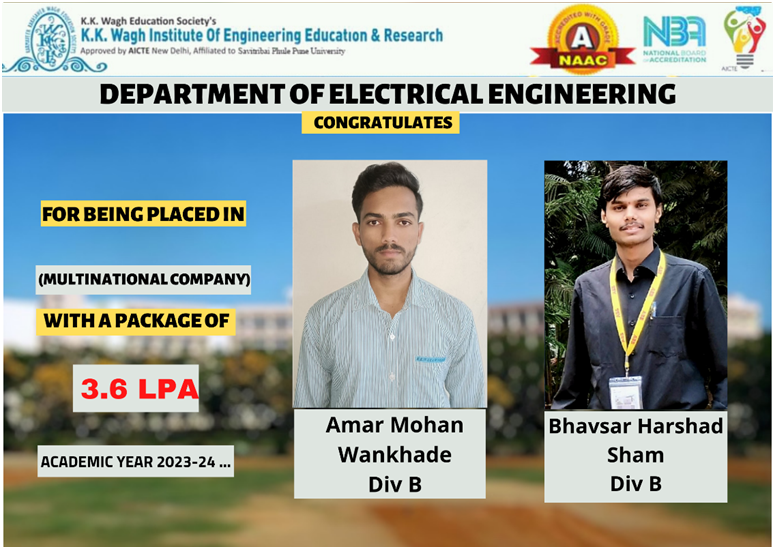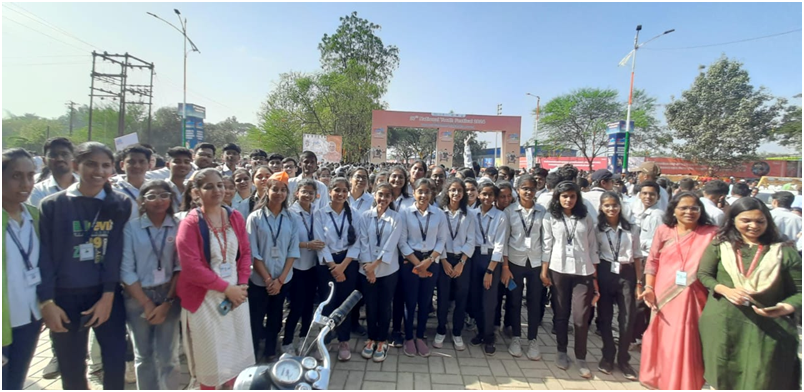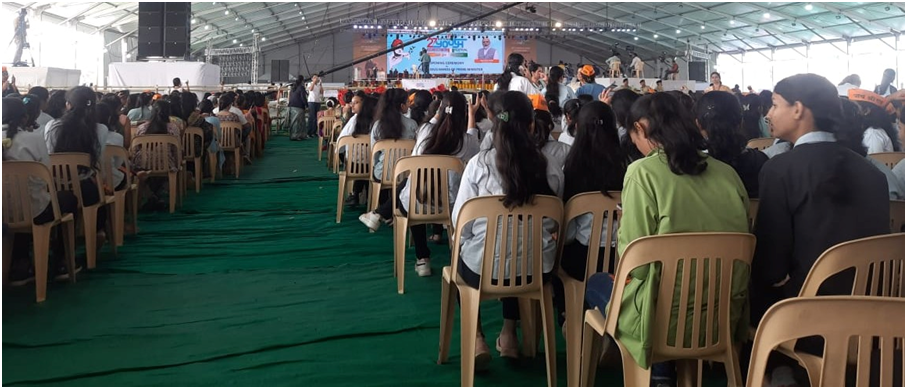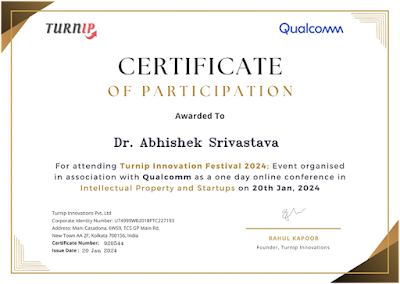Department Events
Expert Lecture on “HV & EHV Switchgear” on 18/01/2024
Department of
Electrical Engineering in Association with the IEEE Students Chapter has organized
an Expert Lecture on “HV & EHV Switchgear”BE Electrical Division: A
and B students and staff of the department on 18/01/2024: Resource
Person: Mr. Rahul S.Patil,
Manager -
Development-R&DCG Power and Industrial Solutions Ltd. Nashik.Total No. of Students present = 96.This lecture helped students to acquire knowledge
regarding Switchgears. The working and operation of High Voltage and Extra High
Voltage switchgear were discussed by expert. The opportunities in the electrical
field were also discussed.
Faculty Development Program on “Pedagogy for Curriculum Delivery” on 6th January 2024
The department has conducted a
Faculty Development Program (FDP) on 6th January 2024 for all the faculty
members of the department on ‘Pedagogy
for Curriculum Delivery’. The objectives of the FDP are to create awareness
about Outcome Based Education (OBE) and to design the course delivery in line
with OBE. All the faculty members actively participated in the FDP and shared
the best practices used by them in course delivery.
The department has conducted an online interactive session for the upcoming campus placement on 21/01/2024.
The department has conducted an online interactive session for the upcoming campus placement at the institute. Our past students Mr. Pavan Avhad and Mr. Aditya Naphade guided all the aspiring students of the department in preparation for the campus placement. They solved the queries of all the students. Thanks to Pavan Avhad and Aditya Naphade for their guidance. The session was coordinated by Prof. Rupali Ahire and Prof. S. Saravanan.
Student Corner
Student Placement
The following students are placed in various multinational companies. Congratulations to all the students!
Placed
Students Details (January - 2024)
|
Sr. No. |
Name of the Student |
Package |
Placement Date |
|
Kirti Lalit Gupta |
5.57 |
17/01/2024 |
|
|
Gauri Ravindra
Chavanke |
6 |
29/01/2024 |
|
|
3. |
Vrushali Jaykumar
Koli |
6 |
29/01/2024 |
|
4. |
Priyanka Sunil Borse |
6 |
29/01/2024 |
|
5. |
Chandan Mahendra
Dhake |
6 |
29/01/2024 |
|
6. |
Shubham Bharat Sardar |
6 |
29/01/2024 |
|
7. |
Indrayani Pandurang
Pawar |
6 |
29/01/2024 |
|
8. |
Aishwarya Sham Joshi |
6 |
29/01/2024 |
|
9. |
Kajal Babanrao
Kharane |
6 |
29/01/2024 |
|
10. |
Disha Prakash Nerkar |
6 |
29/01/2024 |
|
11. |
Prapti Sanjay Borse |
6 |
29/01/2024 |
|
12. |
Gayatri Sanjay Ohol |
6 |
29/01/2024 |
|
13. |
Pratiksha Sadashiv
Shelke |
6 |
29/01/2024 |
|
14. |
Prerna Pramod Surywanshi |
6 |
29/01/2024 |
|
15. |
Amar Mohan Wankhade |
3.6 |
30/01/2024 |
|
16. |
Tejas Tukaram Kamble |
3.6 |
30/01/2024 |
|
17. |
Kaushal Uttam
Warungase |
3.6 |
30/01/2024 |
|
18. |
Vishal Devidas Kardak |
3.6 |
30/01/2024 |
Dr M. R. Roda Gold Medal
Mr Piyush Barhate (BE 2022-23) is awarded the
Sponsored Prize by Dr M. R. Roda with the hands of Mr Prashant Khanolkar
(General Manager, Ion Exchange India Ltd., Mumbai, India and alumnus of
Chemical department) and Principal, Dr K. N. Nandurkar for securing 1st
Position in BE Electrical in the May 2023 Examination in the Maffick 2024 on
31st January 2024. Congratulations to him.
DepartmentToppers - Maffick2024
The following students of the Department of Electrical
Engineering are awarded the Institute Merit Scholarship with the hands of Mr
Prashant Khanolkar (General Manager, Ion Exchange India Ltd., Mumbai, India and
alumnus of Chemical department) and Principal, Dr. K. N. Nandurkar during Maffick
2024 on 31st January 2024.
1. Raut Vishal Vitthal, SE-A - First Topper
2. Dhatrak Hiten Somnath, SE-A -Second Topper
3. Bankar Sushil Anand, SE-A -Third Topper
4. Rupwate Pruthaviraj Ravindra, SE-B -First Topper
5. Deore Tushar Shivaji, SE-B -Second Topper
6. Patil Chandrakant Bhagawan, SE-B -Third Topper
7. Sapkale Himanshu Chhabil, TE-A -First Topper
8. Patil Sanika Rajesh, TE-A -Second Topper
9. Dheple Ishwari Sanjay, TE-A -Third Topper
10. Kalyankar Umesh Namdevrao, TE-B -First Topper
11. Chavanke Gauri Ravindra, TE-B -Second Topper
12. Choukate Aditya Prakash, TE-B -Third Topper
13. Barhate Piyush Bharat, BE-A -First Topper
14. Tungar Sayaji Rajendra, BE-A -Second Topper
15. Shirsole Abhishek Devendra, BE-A -Third Topper
16. Wagulde Harshal Ashwin, BE-B -First Topper
17. Gumbade Omkar Hemant, BE-B -Second Topper
18. Aware Nikhil Sunil, BE-B -Third Topper
19. Pawar Archan Umesh, SY ME- First Topper
20. Wagh Amruta Narendra, SY ME - Second Topper
21. Ghumare Jayshree Ashok, SY ME - Third Topper
Congratulations
Maharashtra State Inter University Silver Jubilee Sports Festival was conducted from 12th to 16th January 2024 at Rashtrasant Tukadoji Maharaj Nagpur University. In this Festival, our student Vaibhavi Shinde (SY B.Tech) secured the Silver Medal in the High Jump for Savitribai Phule Pune University(SPPU)-University of Pune(UoP). Congratulations to her on this achievement.
Congratulations
HIEE Empowering Engineers Pvt. Ltd has conducted an online All India Level Scholarship Test for Electrical Engineering Students across India. Around 525 students participated in this All India Level Scholarship Test. We are glad to share that Mr. Pavankumar Ramrao More – from the Electrical Department (K.K.Wagh Institute of Engineering Education & Research)secured the 3rd Prize - 10,000 Rupees with a Bronze Medal. The 1st and 2nd prize winners are from NIT, Mozoram and Arunachal Pradesh respectively. A total of 15 students from the department participated in the all-India Level Scholarship Test.
Celebration of National Youth Day
On the occasion of Youth Day, the students from the department participated in the 27th National Youth Festival at Nashik. The Prime Minister, Shri Narendra Modi inaugurated the 27th National Youth Festival in Nashik, Maharashtra today. Addressing the gathering, the Prime Minister said that today marks the occasion of India’s youth power and is dedicated to the great personality of Swami Vivekanand who filled the county with new energy and enthusiasm during the period of slavery. Shri Modi conveyed his best wishes to all youth on the occasion of National Youth Day which is celebrated on the birth anniversary of Swami Vivekanand. He also noted the birth anniversary of Rajmata Jijabai, the symbol of India’s women's power and expressed gratitude for being present in Maharashtra on this occasion. Almost 100+ students from the department participated in this festival. Concluding the address, the Prime Minister expressed confidence that the youth of India will fulfill every responsibility with full devotion and ability. From the department Prof. Jitendra Patil, Prof. Nayana Jangle and Prof. Ashwini Khaire participated in the festival.
Faculty Corner
Farewell of Prof. Dr. B. E. Kushare on 27th January 2024
The Department of Electrical Engineering has arranged the
farewell of Prof. Dr. B. E. Kushare
on 27th January 2024. Dr. Kushare has served in the institute (KKWIEER) for
almost 35 years. His contribution to the development of the institute and
department as a whole is really incredible. He has created a long-lasting
impact in the teaching fraternity of Savitribai Phule Pune University by
serving as Chairman Board of Studies for almost 3 turns, solving problems of
industry and society through industrial consultancy. He has guided and mentored
numerous students. He has been a role model for many of us. The department
wishes him a healthy and engaging life in future.
Industry Interaction
Prof. Chetan visited ABB on 2nd January 2023 and interacted with Mr. Manoj Mandlik on various issues.
Industry Interaction
Prof. Saravanan and Prof. Abhishek visited ABB and interacted with Mr. Dayanand Kulkarni, Assistant Vice President, HRBP & Labor Relation Manager, Distribution Solution Division, ABB India Ltd., Nashik
Industry Interaction
Prof. Aishwary Awhad from the department visited Shri. Dhananjay Bele, President of
Nashik Industries & Manufacturers Association (NIMA) on 2nd January 2023.
Patent
The patent is granted for Dr. Ravindra Munje. The other faculty members involved are Dr. Ajinkya Joshi, Dr. Vilas Patil, Dr. S.
S. Banait.
PhD Completion
Dr Alok Kumar from our department has successfully completed
a PhD on 18th January 2024 from the Department of Electrical Engineering, Indian Institute of Technology (Indian
School of Mines), Dhanbad,Jharkhand, India, on the topic 'Diagnosis of oil-paper insulation by
combining time and frequency domain dielectric response' under the guidance
of Prof. A. Baral. The External
Examiner was Prof. Debapriya Das,
Dept. of Electrical Engineering, Indian Institute of Technology, Kharagpur.
Congratulations to him.
Faculty Participation
Prof. Chetan Gadge
from the department attended the Turnip Innovation Festival 2024
organized in association with Qualcomm as a one-day online conference in
Intellectual Property and Start-ups on 20th Jan 2024. Congratulations to him.
Faculty Participation
Prof. Abhishek Srivastava, from the department, attended the Turnip Innovation Festival 2024 organized in association with Qualcomm as a one-day online conference in Intellectual Property and Start-ups on 20th Jan 2024. Congratulations to him.
Republic Day 2024
A group photo of the department
staff after the flag hoisting of 75th Republic Day (26th January 2024)
Student Articles
ControlandprotectionofMMC-based HVDCsystem
JadhavVaibhavRajeshTE-DIVB,(Electrical)Vaibhavjadhav2418@gmail.com
Combining with the first high
voltage direct current (HVDC)
flexibletransmissionsystemprojectinChina,thedemonstrationprojectofflexibleDCpowertransmissioninShanghai
Nanhui Wind Power Station, this paper mainly introduces the modular
multileve lconverter(MMC)based HVDC flexible system.This project which applies HVDC flexible transmission for the first time in China,has completed the experimental phase and has been formally placed into operation.In
this paper, the principle and the controlmethods of thesystem are studied; in
addition, the startup methods and thecontrol methods under normalconditions are
introduced. Furthermore, the protection configurations and protection
principlesofthesystemareanalyzed,whichisofsignificancetotheresearchonHVDCflexiblesystems,aswellastheoperationandmaintenanceoftheprojectinthe Nanhuiwindpowerstation.
1) Introduction
Control of MMC-Based HVDC:MMC technology enables precise control over voltageand current, allowing for optimal power flow management.Advanced control algorithms andreal-time monitoring are integral to regulating the system's performance.Protection of MMC-Based HVDC:Protecting the system against faults and disturbances is paramount to prevent equipment damage and ensure operational stability.The Modular Multilevel Converter (MMC)is a key technology in High Voltage Direct Current (HVDC) systems. Its control and protection mechanisms are vital for stable and secure power transmission. The control system manages voltage and current levels across the converter, ensuring efficient power flow and grid stability.Protection schemes safe guard the MMC against faults, overloads, and abnormal conditions,preventing damage and ensuring uninterrupted operation of the HVDC system.These These mechanisms are crucial for reliable and efficient energy transmission over long distances Principle of MMC converter:Each phase of the MMC converter is composed of 4s cascaded sub-modules[6], as well as the upper and lower bridge arms consisting of 2s sub-module sand one valve reactor respectively (see Fig. 3). Through controlling the trigger voltage of SM, the expected waveform will be output on DC bridge arm or AC line, which is the basic principle of MMC. Moreover,the output voltage of a single sub-module can be zero or Ud, so the output voltage of the sixbridge arms of the converter can be adjusted and controlled independently between zero and2sUd. It can be seen from Fig. 1that the voltage of the upper and the lower arms of the converterare respectively the sum of the output voltage of all the cascaded sub-modules of the upper and thelower arm.The Modular Multilevel Converter (MMC) operates on the principle of modularity and voltage synthesis through multiple sub-modules.By arranging several sub-modulesin series,eachcomprising semiconductor switches and capacitors, the MMC generates output voltages by summing individual sub module voltages inastaircase waveform. Employing modulation techniques like Phase-Shifted Pulse Width Modulation (PWM) or Level-Shifted PWM, it precisely controls these sub-module voltages to achieve desired out put wave forms with reduced harmonics. Critical to its operation is maintaining balanced capacitor voltages acrosssub-modules, managed through control algorithms for improved reliability. Its modular design allows scalability,flexibility,and efficient handling of high voltages at lower switching frequencies, distinguishing the MMC as a high-performance converter in HVDC transmission systems and high-voltage motor drives. The MMC's principle fundamentally relies on its modular architecture, where each sub-module consists of a small voltage source and capacitors. This modular design allows easy scalability,enabling adjustment of the converter's voltage and power capabilities by adding or removing these sub-modules.Additionally,the converter synthesizes output voltage by stacking the voltage levels of individual sub-modules in a staircase waveform, offering precise control overthe output waveform.
Fig.1.MMCmodule
2) Controlmethods
MMC control system
can be divided into three levels, which from high-level to low-level respectively
are system-level control, converter-level control and valve-level control.
Thesystem-level control receives instructions from operators, and the reference
voltage of eachbridgearm of the converter can be generated and sent to the
converter-level control accordingto the instructions. In accordance with the
reference voltage, the converter-level control
adopts appropriate control method sand modulation to obtain the trigger pulse sequence of the converter
valve, and then the valve base is triggered by valve-level control based on the
trigger pulse.The system-level control method of an MMC converter station
generally can be divided into two categories:
1.1) Active
power control:Themain function is to directly control the active power that is injected into the AC system through the converter station, or indirectly
adjust the parameters related to the active power, such as DC voltage, DC current
and AC system frequency. This category includes ķ active power control, ĸ DC
voltage control, ĹDC current control, ĺ frequency control.
1.2)
Reactive power control:
The main function is to directly control the reactive power injected into the AC
system through the converter station, or indirectly adjust the parameters
related to the reactive power.This category includes ķ reactive powe rcontroland ĸAC voltage control.
Conclusion
Effective control and protection are paramount for the reliability and performance ofMMC-based HVDC transmission systems. These technologies offer enhanced controllability and efficiency in long-distance power transmission. Robust control strategies and advanced protection schemes are essential to ensure system reliability and grid stability, making MMC based HVDC a critical component of modern energy networks.













































